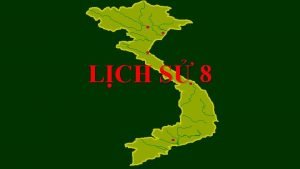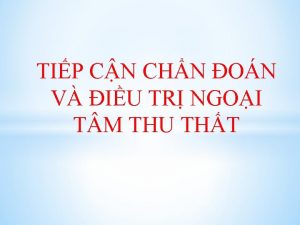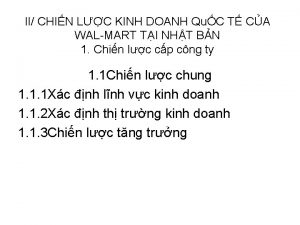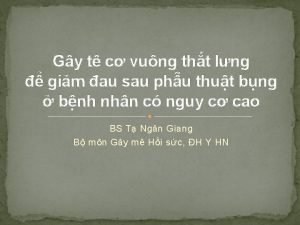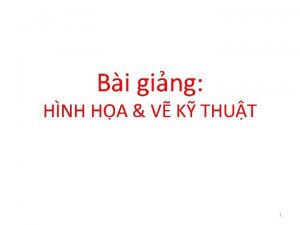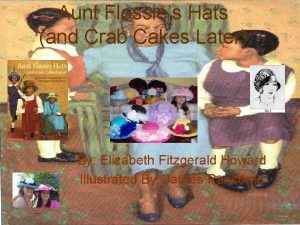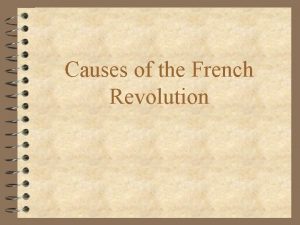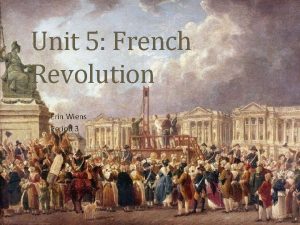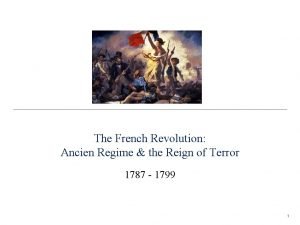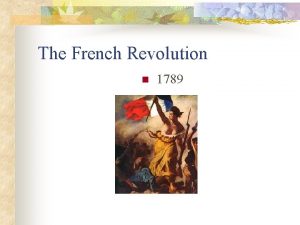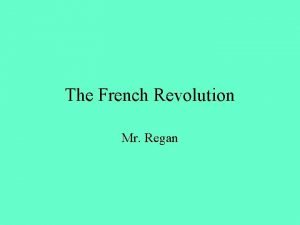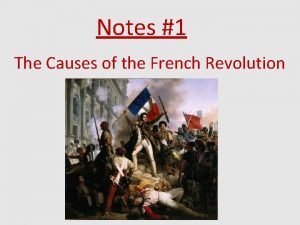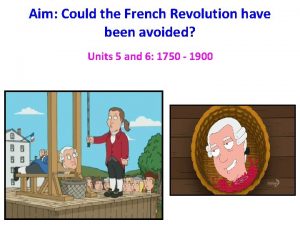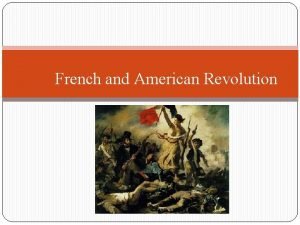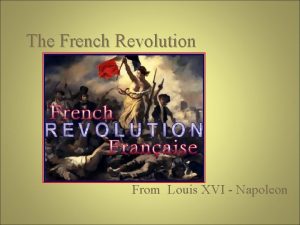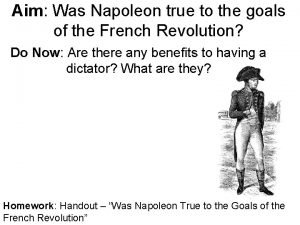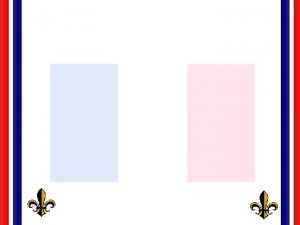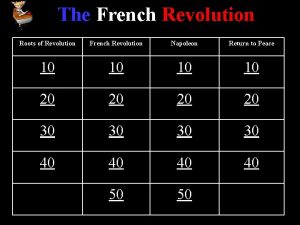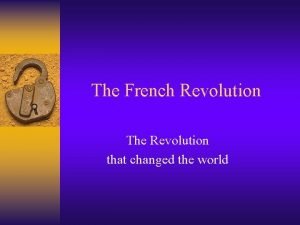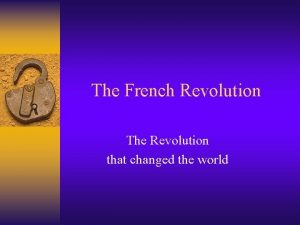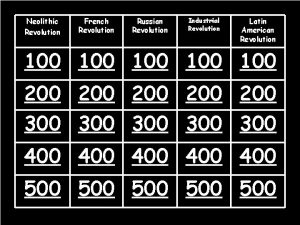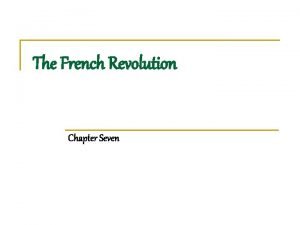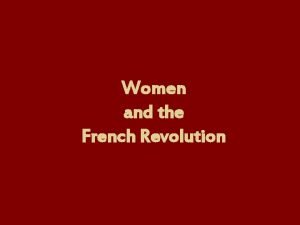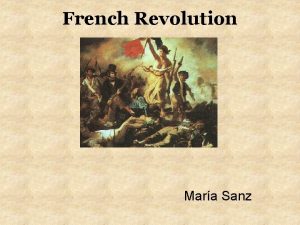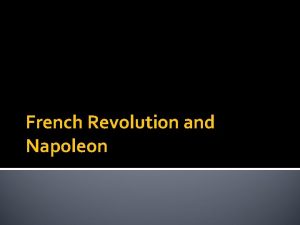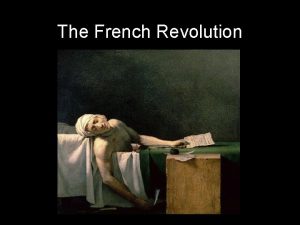The French Revolution The Revolution that changed the




























- Slides: 28

The French Revolution The Revolution that changed the world

French Society: divided into three estates First Estate: Clergy Second Estate: Nobility Third Estate: Everyone else

Third Estate Divided into three sub classes: ¨ 1. Bourgeoisie Rich and well educated merchants and artisans ¨ 2. Servants (Working class, lived in cities) Poor wage earners Price of bread was very important to them ¨ 3. Peasants (80% of people) Heavily taxed, Farmers had to work for nobles/ clergy for free

France’s National Problems 1. Crop failures led to grain shortages 2. Large debt due to Wars (in the Americas) – Bankers refused to lend more money 3. Weak leader

King and Queen of France ¨ Louis XVI- – Great Grandson of Louis XIV – Not very focused on his duties • Wanted to have fun (hunt, play with locks, etc) ¨ Marie Antoinette- – Daughter of Austrian Maria Theresa – big spender






Louis is forced to call the Estates. General (May 1789) ¨ meeting of all 3 estates ¨ first time in 175 yrs. ¨ Each estate gets 1 vote – (clergy had one, nobles had one) ¨ 3 rd Estate was always out voted by the other two estates

Estates-General of May 1789 ¨ Estates-General called at request of 1 st & 2 nd Estates – Goal: To limit the powers of the monarchy ¨ 1 st and 2 nd Estate – feared losing money from Louis’ big spending…wanted to control him ¨ 3 rd Estate – complained about unequal voting rights. – Estates-General refused to listen to them and the 3 rd Estate was locked out.

Tennis Court Oath (June 1789) ¨ Third Estate met separately ¨ New name=National Assembly ¨ Declared that the Assembly, not the king, were the voice of the people

Tennis Court Oath (National Assembly is formed) Rumors start King fears that the people are going revolt Rumor of King’s army coming to stop the NA meetings People storm the Bastille to get ready (get gun powder)


Declaration of the Rights of Man – Issued August 26, 1789 – “Men are born and remain free and equal in rights” • Women were not included • Right to liberty, property, security, and resistance to oppression • Sets up a Constitutional Monarchy

Women’s Bread Riot, October 5 th 1789 ¨ Price of bread (and other necessities) rise ¨ Thousands of women took up arms and marched 12 miles to Versailles (King’s palace) ¨ Killed two guards ¨ Forced the king and his family to move to Paris

Palace of Versailles (where King Louis is living)

Louis tries to escape France (June 1791) ¨ On his way to Austria – Stopped by townsmen and guards ¨ Many argue that the King is not to be trusted

Europe turns against the Revolution ¨ Austria (Marie’s Homeland) feared that the revolution against nobility would spread to other nations. – Austria declared war on France in 1792, later joined by Prussia, Holland, Spain, and England. . – Austrian and Prussian forces near Paris and threatened to destroy Paris if the Royal family was harmed – Outraged Parisian mob kills the King’s Swiss guards and imprisons the royal family in a tower.


King No More ¨ The revolutionaries defeat the invading armies ¨ The Jacobins establish a Republic. ¨ Louis is beheaded by the Guillotine (Jan. 1793)

Guillotine ¨Decapitation was punishment for nobility=now equal

New Leader: Maximilien Robespierre Revolution goes past politics ¨ Slavery is outlawed ¨ Death penalty is outlawed (predict: why is this ironic? ) ¨ Religious Freedom for Jews and Protestants ¨ Playing cards—no jacks, queens and kings ¨ Calendar was changed to 12 months 30 days each, 10 day week, no Sundays (religion seen as old fashion) ¨ All churches were closed ¨ Bread prices were controlled

Committee of Public Safety (July 1793 to July 1794) ¨ Led by Robespierre ¨ Ordered to root out traitors of the Revolution ¨ No one was safe ¨ Neighbors turned on neighbors

Reign of Terror ¨ Run by the Committee of Public Safety ¨ Killed: – Marie Antoinette – early leaders of the revolution – fellow Jacobins – Robespierre was killed (July 1794) – About 40, 000 people had been killed, most=commoners


 Russian revolution vs french revolution
Russian revolution vs french revolution You should hope this game will be over soon
You should hope this game will be over soon Thơ thất ngôn tứ tuyệt đường luật
Thơ thất ngôn tứ tuyệt đường luật Tôn thất thuyết là ai
Tôn thất thuyết là ai Phân độ lown
Phân độ lown Walmart thất bại ở nhật
Walmart thất bại ở nhật Gây tê cơ vuông thắt lưng
Gây tê cơ vuông thắt lưng Block nhĩ thất độ 2 type 1
Block nhĩ thất độ 2 type 1 Tìm độ lớn thật của tam giác abc
Tìm độ lớn thật của tam giác abc Sau thất bại ở hồ điển triệt
Sau thất bại ở hồ điển triệt Thể thơ truyền thống
Thể thơ truyền thống Hãy nói thật ít để làm được nhiều
Hãy nói thật ít để làm được nhiều Flossies kitten rescue
Flossies kitten rescue French revolution recipe
French revolution recipe Conclusion of french revolution
Conclusion of french revolution How french society was divid
How french society was divid War with austria french revolution
War with austria french revolution Objectives of french revolution
Objectives of french revolution French absolutism enlightenment & revolution
French absolutism enlightenment & revolution N
N European rulers denounced the french revolution because
European rulers denounced the french revolution because France estates
France estates Explain the causes of french revolution
Explain the causes of french revolution You should hope that this game will be over soon
You should hope that this game will be over soon Intendants ap world history
Intendants ap world history Effect of the american revolution
Effect of the american revolution Jack and jill french revolution
Jack and jill french revolution Napoleon's goals
Napoleon's goals French revolution causes and effects
French revolution causes and effects



